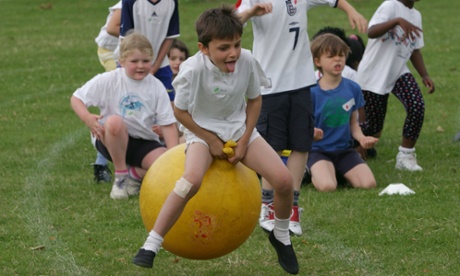
Sports day involves lots of running about and jumping through hoops – and organising the event is no different.
With National School Sport Week fast approaching (22-26 June), this week on the Guardian Teacher Network we have a sack full of ideas and resources to help make sure your sports day is a winner.
The first part of your planning should involve getting the date and venue agreed. Do this early on in the year and you’ll have lots of time to decide on your events.
One idea for primary students is to pick games that build on fundamental movement skills that students have learned in physical eduction (PE) throughout the year. Active for Life – a social enterprise organisation that promotes physical literacy – recommend doing this, and suggest a relay race in which students jump into and over various obstacles, or a rolling race in which students work together to move like “sneaky snakes”. Other ideas include a golf course made using beanbags and hula hoops, a wheelbarrow race, crab walk and a standing broad jump.
It’s important to be clear on the rules for each activity and to ensure that everyone knows how to take part. In the wheelbarrow race, for example, students must lift each other by the thighs rather than the feet to avoid collapsingthe back. You’ll find more tips and advice in this British Heart Foundation leaflet.
A circuit of activities in which teams can take part also works well, as recommended in these Teaching Ideas lesson plans for primary children. Another good idea is to have something for everyone, from hula-hoop challenges and space hopper races to more competitive relay and running races.
A great source of ideas for secondary schools is the Sainsbury’s School Games website. It includes competition guides for traditional, modified and alternative formats of sports designed to appeal to all young people. Especially useful for sports day are the suggestions for team-based athletics events, and an amazing game called goalball that was originally developed for visually impaired second world war veterans. There are resources for primary schools too.
The key to a successful sports day is making sure that everyone is having fun, including students who aren’t really sporty or lack confidence. You’re guaranteed to raise a lot of laughs with water-based games such as a bucket relay: teams line up with a bucket of water at the front of the line and an empty bucket at the back. The first person in the line fills a cup from the bucket. The team then passes the cup over their heads to the back of the line where it is emptied into the second bucket. The winning team is the first to move all of the water from the front of the line to the back. You’ll find more games such as this to suit primary pupils of all abilities, here.
One of the most important things about sports day is celebrating achievement and encouraging everyone to join in. These award certificates by Twinkl are perfect for motivating and rewarding pupils, as are these rosettes. We also have a sports day banner and editable poster that can be used to promote your event.
If you are feeling tired of traditional egg-and-spoon and three-legged races, you might want to give your sports day a theme. This Roald Dahl sports day pack has a number of suggested events such as an Oompa-Loompa obstacle course and a Twits versus The Witches netball match. The aim is to bring a twist to familiar PE activities while capturing the imagination of reluctant readers. The pack includes posters and participation certificates.
If one sports day isn’t enough, you could consider holding a week of activities as part of National School Sport Week. Organised by Youth Sport Trust, the aim is to encourage young people of all ages and abilities to try new sports. All schools who sign up will receive a free resource pack – a sample of which is provided here. Ideas for secondary schools include a staff versus students rounders or badminton competition.
Once all of the races are over, there are a variety of ways you can bring the fun of sports day into the classroom. Use the results in maths to create tables, charts and graphs. In English, write newspaper reports about what happened, or record audio podcasts of the highlights. Early primary students can use these worksheets to label different sports and equipment; key stage 2 pupils can explore the function of carbohydrate, protein and fat in an active lifestyle; and secondary pupils can debate whether, in sport, winning is the only thing that matters.
For more sports-themed ideas, see these How to teach ... articles about running, yoga, water safety, which include tips on swimming, and tennis.
The PE and school sports series is funded by the Youth Sport Trust. All content is editorially independent except for pieces labelled “brought to you by”. Find out more here.

